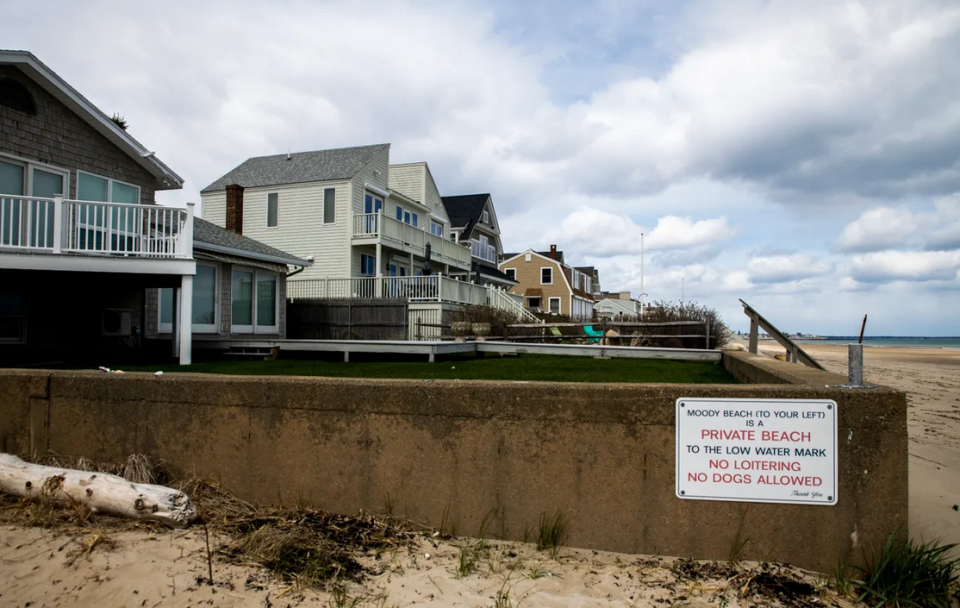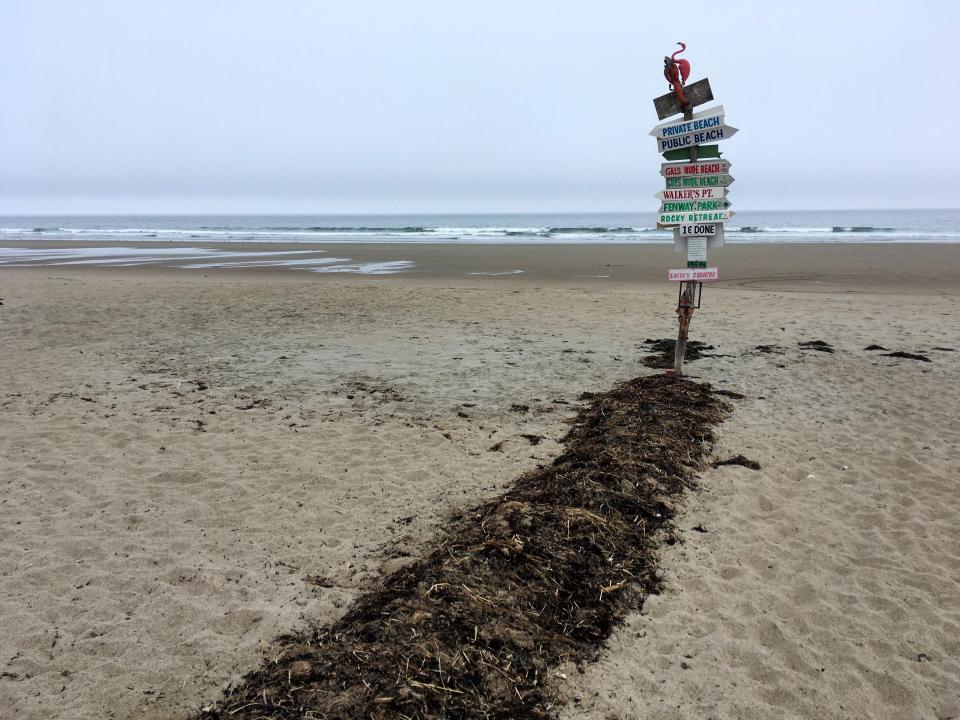Free Moody Beach: Group wants signs to let beachgoers know they can go on private beach
WELLS, Maine — A local group’s fight for fuller public access to the intertidal zones of Maine’s beaches is continuing into the new year, with an effort to change town signs to reflect what is allowed on privately owned properties at Moody Beach.
The group, Free Moody Beach, is claiming that town-erected signs at three rights-of-way at Moody Beach are misleading in their wording because they do not state Maine law accurately, according to spokesperson Jeannie Connerny.
The group claims that the signs, as written, “serve to encourage beachfront homeowners who engage in aggressive tactics to intimidate beachgoers,” according to its recent press release. The group added that it wants the signs to be “accurate and balanced.”

Currently, the signs read, “Public Right of Way to Water,” “Private Beach on Either Side of the Public Way,” and “No Town Beach Services Available.”
Free Moody Beaches is proposing the signs also have the language, “Lawful on Entire Beach: Fishing Fowling Navigation,” so that beachgoers can know what they are allowed to do in the intertidal zones.
“We want Wells to state the total law,” Connerny said.
The group has sent an email about its concerns about the signs to Wells Public Works Director Carol Murray but has not received a response, according to Connerny.
Murray confirmed this week that she had received the email. She said that given that her expertise is engineering and not the law, she forwarded the group’s request to Town Manager Michael Pardue for legal review by the town’s attorney.
The group said it would “work within whatever policy review process the town has” for changing local signs.
New homes, hotel, more: York, Kennebunk, Wells projects coming in 2024
Wells declined to join Free Moody Beach effort
The request comes three months after the town of Wells declined to join public-use advocates in their fight to gain more access to local intertidal lands that are privately owned.
Specifically, the group wanted the town to support Our Maine Beaches in its lawsuit against three Moody Beach property owners.
Our Maine Beaches filed suit in 2021 to return private beaches along the Maine coast to the public. While a judge ruled that the property owners owned the intertidal land, it did not address what constitutes acceptable public use.
In May, Our Maine Beaches, represented by attorney Benjamin Ford, filed a motion seeking a summary judgment declaring that 36 activities, from scientific research to birdwatching to building sandcastles, are legal and allowed on the state's beaches and intertidal lands under current law.
The judge has not yet ruled on the issue, Ford said.

Free Moody Beach urged Wells in a letter this fall to follow the same approach as Kennebunkport when it successfully argued, in a case decided in Maine Superior Court in 2019, that the town owned Goose Rocks Beach. In the letter, the group argued that the Kennebunkport case showed that legal pathways exist for Wells, despite a 1989 court ruling – in the case of Bell v. Town of Wells – that said certain intertidal zones on Moody Beach were privately owned.
The motion pursued by Our Maine Beaches has roots in that case settled more than 30 years ago.
In Bell v. Town of Wells, also known as the Moody Beach case, the state's top court ruled that the only public rights recognized in privately owned intertidal areas are those outlined in a colonial ordinance from the 1600s: fishing, fowling and navigating.
That means beachfront property owners along Maine's coasts have property rights down to the low-tide area, except for an easement to allow the public to engage in those three permitted activities.
Pardue responded to Free Moody Beach’s letter in October. He told the group that Wells was not prepared to join its efforts or those of other advocates due to the pending legal matters in court.
York County's 10 top sales in 2023: Kennebunkport home sells for record $9M
Free Moody Beach vows to step up public access campaign
Pardue’s response in October prompted Free Moody Beach to declare that it would no longer make “arm’s-length appeals” to the town and instead would “roll up our sleeves and do the work ourselves.”
The group vowed to increase its civic activism in 2024 to push for the right of residents to freely use beaches and intertidal lands in Maine. Changing the wording on the right-of-way signs is the group’s first task in that effort, the group said in a press release.
“If direct participation in town government processes is required to effect change, then that’s what we’ll do,” Connerney said.
Free Moody Beach cited a poll, conducted by Digital Research, Inc. and reported in the Maine Morning Star in October, that more than 70% of participants support measures to “expand public access” to Maine beaches and intertidal lands.
“The machinery at town hall must begin working for the town's residents, the majority of whom want beach rights restored,” Connerney said. “Wells is supposed to be a democracy. We want it to act like one.”
Murray said the request to change the signage is with the town manager. However, she suggested the sign proposed by Free Moody Beaches is too wordy and, therefore, likely would not be read in full by people if posted.
“That’s a lot of words on a small sign,” she said. “With signs, we try to keep things as succinct as possible.”
More: Center for Wildlife enters final phase of major expansion with 'limitless possibilities'
This article originally appeared on Portsmouth Herald: Free Moody Beach calls for new signs amid public access dispute

